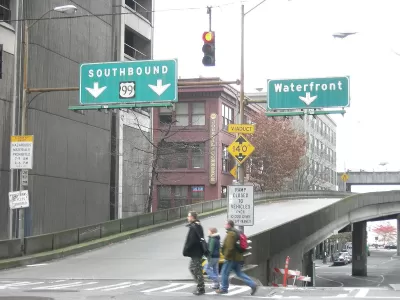Looking for traffic safety improvements while responding to 2020's Black Lives Matter protests, Seattle has spent much of the past two years implementing a Safe System approach to move closer to its Vision Zero goal to eliminate traffic fatalities.

Ryan Packer reports in detail on the ongoing evolution of the city of Seattle's Vision Zero initiative to end traffic fatalities. According to Packer, the Seattle Department of Transportation is in the process of moving away from "emphasis patrols" performed in conjunction with the Seattle Police Department to target specific dangerous driving behaviors. In the place of such enforcement measures, the city is implementing a Safe System approach.
According to Allison Schwartz, the city's Vision Zero coordinator, the safe systems approach "emphasizes the responsibility of a city to design and operate our transportation system in a way that acknowledges and plans for both human error and human frailty." (A recent Planetizen article by Angie Schmitt provides additional details about the Safe Systems approach to traffic safety.)
As proof of the shift away from enforcement, Packer cites the Safe Routes to Schools action plan published by the city last year. The seven "Es" proposed for action by the plan notably lack "enforcement."
And for proof of the shift toward Safe Systems, Packer lists attention to high-injury corridors, leading pedestrian intervals, and hardened center lines.
The source article includes a lot more detail and context for the shifting Vision Zero approach in Seattle.
FULL STORY: As Statewide Traffic Safety Emergency Escalates, Seattle’s Vision Zero Department Charts New Path

Planetizen Federal Action Tracker
A weekly monitor of how Trump’s orders and actions are impacting planners and planning in America.

Congressman Proposes Bill to Rename DC Metro “Trump Train”
The Make Autorail Great Again Act would withhold federal funding to the system until the Washington Metropolitan Area Transit Authority (WMATA), rebrands as the Washington Metropolitan Authority for Greater Access (WMAGA).

DARTSpace Platform Streamlines Dallas TOD Application Process
The Dallas transit agency hopes a shorter permitting timeline will boost transit-oriented development around rail stations.

Renters Now Outnumber Homeowners in Over 200 US Suburbs
High housing costs in city centers and the new-found flexibility offered by remote work are pushing more renters to suburban areas.

The Tiny, Adorable $7,000 Car Turning Japan Onto EVs
The single seat Mibot charges from a regular plug as quickly as an iPad, and is about half the price of an average EV.

Supreme Court Ruling in Pipeline Case Guts Federal Environmental Law
The decision limits the scope of a federal law that mandates extensive environmental impact reviews of energy, infrastructure, and transportation projects.
Urban Design for Planners 1: Software Tools
This six-course series explores essential urban design concepts using open source software and equips planners with the tools they need to participate fully in the urban design process.
Planning for Universal Design
Learn the tools for implementing Universal Design in planning regulations.
Municipality of Princeton
Roanoke Valley-Alleghany Regional Commission
City of Mt Shasta
City of Camden Redevelopment Agency
City of Astoria
Transportation Research & Education Center (TREC) at Portland State University
US High Speed Rail Association
City of Camden Redevelopment Agency
Municipality of Princeton (NJ)




























